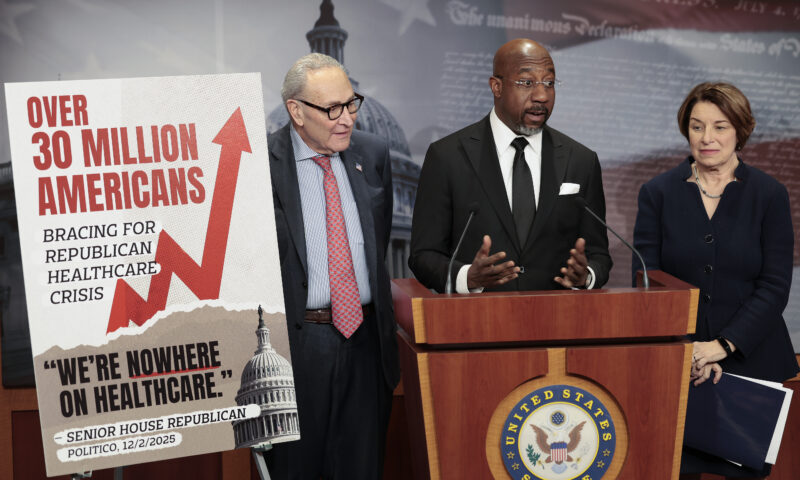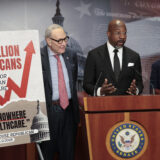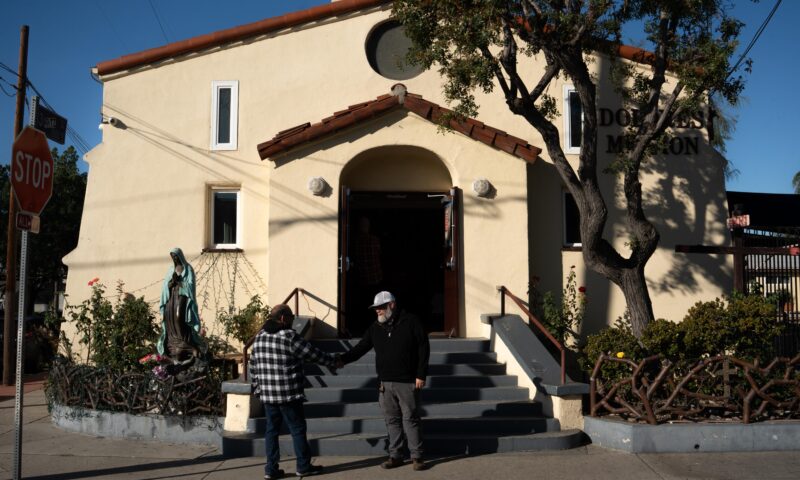The marriage of Silicon Valley billionaires and far-right MAGA voters has given rise to “end-times fascism” characterized by “monstrous, supremacist survivalism,” author Naomi Klein writes in her latest essay with Astra Taylor for The Guardian. Klein describes tech oligarchs preparing for an apocalyptic end to life on Earth, fueled by the carbon emissions generated by the companies they own, by escaping to bunkers or through colonizing Mars.
Capital & Main’s Cerise Castle spoke with Klein on Wednesday about what she sees as the path forward at the University of California, Los Angeles’ Nimoy Theater in Westwood ahead of her lecture “Fascism or Eco-Populism — Our Stark Choice,” presented by the UCLA Luskin Institute on Inequality and Democracy.
This interview was edited for brevity and clarity.
Capital & Main: We just watched Katy Perry and Gayle King blast off into space on Jeff Bezos’ rocket, and we see this abandonment of Earth as a hospitable place for humanity positioned as a high value morality. Can you talk about the role that popular culture plays in creating that narrative?
Naomi Klein: Popular culture is involved in this on so many levels. Elon Musk will often take something that was written as a warning and use it as a how-to manual, for instance, like The Hitchhiker’s Guide to the Galaxy. Jeff Bezos was fascinated with Star Trek, but . . . Star Trek is basically socialism in space, but so he missed all that.
I think their fascination with sci-fi points to the fact that we are really kind of in unprecedented territories. And often a lot of the discourse on Trump and fascism tends to look backwards and just assume that everything that we’re seeing now has happened before. So there’s kind of like a checklist around like, “OK, well, Mussolini did this,” or “Hitler did this and they’re doing it.”
And you’re there with your checklist waiting for attacks on the courts, attacks on universities, creating an outgroup. But the danger of that is that we don’t see what is actually new about our moment in history. When there was fascism at scale in Europe in the 1930s, there wasn’t an atomic bomb yet. There was no understanding of the climate crisis and the connections between fossil fuels. I think that our billionaire class understands that we are in a moment of existential risk, that whether it’s a global pandemic and the nature of our interconnected world, whether it is nuclear weapons, whether it’s the climate crisis, we are in a moment of unparalleled peril.
What is distressing about what they believe is that they take that ending almost for granted, right? And this is why I’ve been focusing on all the different kinds of escape fantasies that popular culture is fueling. I don’t think that they’re doing this because they watch Silo or Paradise. I think we’re watching Paradise and Silo because we know that they are actually building their bunkers and sort of betting on apocalypse in lots of ways.
“The most serious vulnerability that Trump has is that a large part of his base really hates Silicon Valley and is not interested in being replaced by machines.”
Really what we’re dealing with more than anything else is the corrupting effect of an unprecedented level of wealth concentration. I’ve been covering wealth concentration my whole life, and it’s just exploded. And so it’s one thing to be like, “OK, a CEO is making 200 times what his workers are making,” which is like the kind of math that I was doing when I started becoming a journalist. But when you think about the levels of wealth that are now concentrated in the hands of a Jeff Bezos or an Elon Musk, I think they truly believe that they’re gods. The point of their wealth is to be able to exercise a kind of absolute power.
And so this moment of counterrevolution that we’re in is strange because there never was a revolution, right? They’re upset about pronouns. They’re upset that their workers wanted to have some workplace democracy. And it seems so minor, right? They’re upset about DEI. These are not revolutionary gains that have been made by social movements. What we need to understand is that they really do believe that their power should be absolute.
In your recent essay for The Guardian, you’re talking a lot about coalition building as a solution to the state that we are currently in. How does one reach the working class, for example — people that you described in Doppelganger as perhaps future laborers that are identifying with the billionaire rulers or even content to be subservient to them?
Like, this sort of oddness of Trump’s coalition and why somebody like RFK Jr. is in it, and what the appeal of that is and the coalition that they’re building. A lot of people I know really willingly just tuned all of that out and felt pretty smug about it and were like, “Why would I ever do that to myself?” It just seems to me to be such a strange decision, especially if you’re a journalist or a scholar and you’re attempting to understand this world, why would you willingly just ignore half of it?
And one of the things that spending a lot of time listening, for instance, to Steve Bannon has made me realize is that this coalition that Trump has is very, very vulnerable, especially when it comes to the alliance that he has made with Silicon Valley and Big Tech. That sector cares about one thing and one thing only right now, and that is AI. And the extent to which that was never part of what Trump ran on, it is the opposite of what many people thought they were voting for. These technologies are the greatest threat to working class people.
The most serious vulnerability that Trump has is that a large part of his base really hates Silicon Valley and is not interested in being replaced by machines. So it’s a monumental bait-and-switch that Trump has done with this immediate alignment with the billionaire class in Silicon Valley, and if the left can’t exploit that, then we’re doing something wrong.
“There are a lot of people who voted Democrat their whole lives and voted for Trump in this election because they thought he was going to bring the jobs home.”
What is the best means of exploiting that vulnerability?
I think heightening the contradictions and the sense of betrayal. People have a right to feel very, very betrayed, particularly when it comes to jobs.
It’s not about convincing every single Trump voter that they’ve been led astray. I think a lot of people are actually getting what they want, which is a sort of a fascistic strongman, and they’re getting pleasures related to dominance and hierarchy and supremacy. We’re not going to get those people. But I genuinely believe that there are a lot of people who voted Democrat their whole lives and voted for Trump in this election because they thought he was going to bring the jobs home. They thought he was standing up to these big companies who they feel have treated them very unfairly, and it was a lie.
One of the things I’ve learned from studying Steve Bannon is he takes the task of peeling away parts of the Democrats’ coalition very seriously, and he’s done it very successfully again and again. So why wouldn’t we try to do it back to him?
Is it possible to interrupt someone’s beliefs, and if so, how can that be done?
If it’s possible, it’s gonna be somebody who has a relationship of trust with that person. It’s not usually gonna happen because you get into a screaming match or you sort of barrage them with your true facts versus their wrong facts. I think some of the most effective results are when people find something that they do agree on, right? And you can sort of extend a bridge.
So, say it’s somebody who believes in very untrue things about vaccines; maybe you also have some strong feelings about pharmaceutical companies and how they’re taking advantage of people’s pain, and maybe you can find a point of connection and then sort of bring someone back. I wouldn’t think about it so much as an interruption as a kind of extending a bridge to someone who might be ready to kind of get out of there.
Copyright 2025 Capital & Main


 Locked OutDecember 16, 2025
Locked OutDecember 16, 2025
 Column - California UncoveredDecember 12, 2025
Column - California UncoveredDecember 12, 2025
 Locked OutDecember 23, 2025
Locked OutDecember 23, 2025
 The SlickDecember 19, 2025
The SlickDecember 19, 2025
 Column - State of InequalityDecember 11, 2025
Column - State of InequalityDecember 11, 2025
 Locked OutDecember 17, 2025
Locked OutDecember 17, 2025
 Latest NewsDecember 22, 2025
Latest NewsDecember 22, 2025
 Column - State of InequalityDecember 18, 2025
Column - State of InequalityDecember 18, 2025

